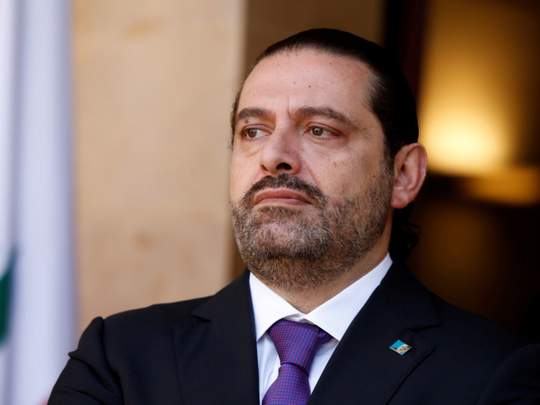
The resignation of Lebanese Prime Minister Saad Hariri was the topic that dominated headlines this week in the region’s papers.
It has only been year since Saad Hariri was appointed the Prime Minister of Lebanon, and now he has resigned, leaving the doors open for interpretations indicating that Lebanon has entered a very dangerous phase, wrote Egypt’s Al Ahram.
“Hariri’s speech was clear and void of any diplomatic rhetoric, in which he stated that the primary reason for his resignation was Hezbollah, which he described as ‘a state within a state’. Lebanon is now at a dangerous crossroads, and political parties have to be honest with themselves and ask whether they want an independent and secure Lebanon or to hand their nation to Iran to become a means to an end that will result in the region’s destruction. The answer now lies within the Lebanese themselves, because only they can preserve the unity of their nation, safety of fellow citizens and national security.”
Though Prime Minister Hariri’s resignation was an unexpected development, it was inevitable something, somewhere would give as Iran’s intervention in Lebanon through Hezbollah and its allies reaches an unacceptable level, said Lebanon’s Daily Star.
“The hope now is that this bombshell, notwithstanding the geography, acts as a wake-up call and draws attention to the situation. Hezbollah and its allies should have seen the signs of this development, especially as Hariri exhausted every avenue to compromise in the quest for a national unity independent policy, and many times sacrificed his own personal popularity among many a Lebanese party. This bombshell has reshuffled all the cards on the Lebanese political scene, and it is imperative that all officials and parties avoid demagoguery and address the resignation with sober heads and restraint, focusing on preserving the calm, security and stability in the country, and making sure it is not thrown into the high seas without a chart.”
After daily dealings with Hezbollah, which succeeded in creating deep changes within the choices of the Shi’ite sect in Lebanon, Hariri discovered that the party is insistent on achieving a complete change in Lebanon’s position and identity, said the London-based Pan-Arab paper Asharq Al Awsat.
“The party’s policies have employed the Lebanese scene in favour of the major Iranian coup in the region and in the crises with Lebanon’s natural allies, meaning Saudi Arabia and the Gulf countries. It has also caused crises and complications with the US and other nations. Hariri grew tired of drinking poison. He could not accept that his government would be transformed into some form of agreement to approve the process of changing Lebanon’s position, identity and eventual isolation from its Arab fold. In this regard, his resignation came as a form of revolt. That is why it was frank and clear and phrased in damning terms, which he had previously avoided out of his keenness on stability and civil peace.”
The surprise resignation of Hariri is bound to complicate even more an already complex and tense situation in the region, noted the Jordan Times.
“Speaking from the Saudi capital Riyadh, Hariri said: “We are living in a climate similar to the atmosphere that prevailed before the assassination of martyr Rafik Al Hariri”. It was not so veiled an accusation. And if there were any doubts, he made a more direct reference to Iran and its followers, threatening that Lebanon would “cut off the hands that wickedly extend into it”. When he took office, Hariri promised “a new era for Lebanon”, which had been in a political deadlock for two years. He indeed formed a coalition government that brought together most of Lebanon’s political parties, including Hezbollah. His sudden departure from the political scene will complicate Lebanon’s politics.”





_resources1_16a31069e4e_small.jpg)






